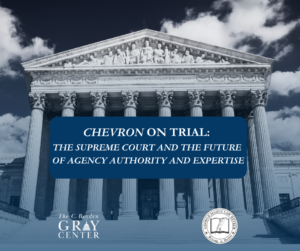The George Mason Law Review’s Chevron on Trial Symposium Issue, by Megan Dill

This week the George Mason Law Review published the accompanying print issue to its Fall 2023 Symposium, Chevron on Trial: The Supreme Court and the Future of Agency Authority and Expertise. The focus of the symposium was the fate of Chevron deference in light of the Supreme Court’s pending decisions in Loper Bright Enterprises v. Raimondo and Relentless, Inc v. Department of Commerce.
This issue contains eleven essays from administrative law scholars, many of whom spoke at the in-person symposium event in October. No symposium essay can be the final word on the subject, but we hope these essays are the first words in a broader conversation. These essays cover a wide range of Chevron-related topics, such as:
- Professor Aditya Bamzai assesses the Administrative Procedure Act’s antecedents, text, structure, and legislative history from the 1940s that establish the relevant standard of review.
- Professors Kent Barnett & Christopher Walker argue in their piece, based on the amici curiae brief they filed, that the Court should not overrule Chevron in Loper Bright Enterprises v. Raimondo.
- Professor Lisa Schultz Bressman predicts that even if Loper Bright Enterprises v. Raimondo overrules or limits Chevron, the practical effect on the lower courts will be less than expected.
- Professor Caroline Cecot explores the meaning of “silence” at issue in Loper Bright Enterprises v. Raimondo and the potential consequences of excluding such silence from the Chevron doctrine.
- Professor John Duffy argues that the Court should, in Loper Bright Enterprises v. Raimondo, review the relevant statutes de novo to avoid creating an increasingly complicated rule for granting and denying deference to agency legal interpretations.
- Professor Emily Hammond illustrates why getting deference to agency expertise correct matters by describing a richer, more nuanced understanding of agency expertise.
- Professor Jonathan Masur argues that repealing Chevron would entrench the status quo by impeding agencies from eliminating existing regulations and that understanding this effect is critical to assessing the future of the regulatory state.
- Mr. Eli Nachmany defines three types of agency expertise that populate the Chevron caselaw and argues that the court should look for interpretive expertise when considering whether an agency’s interpretation merits special weight.
- Professor Victoria Nourse aims to understand the shifts in interpretive thought and textualism by examining textualism’s uneasy relationship with the major questions doctrine and reviewing a larger empirical study of the Court’s most recent decisions.
- Professor Adrian Vermeule considers the dilemma between broad delegations of agency authority and the proper function of judicial review, and contrasts what a modest resolution in Loper Bright Enterprises v. Raimondo might look like versus an outright overruling of Chevron.
- Professor Daniel Walters argues that the prevailing approach to judicial review of agency interpretations of law is politically contingent and explores four possible futures of Chevron deference based on the Court’s level of certainty about its relationship to the executive branch.
The issue also includes two thoughtful student comments: Jacob Kistler’s Twitter Taint: Content Questioning Voir Dire in the Modern Age of Social-Media-Addled Venires, and Jake Settle’s Origination and Original Meaning: Reviving the Origination Clause to Restrain the Administrative State.
Many thanks to the C. Boyden Gray Center for the Study of the Administrative State at Antonin Scalia Law School for helping to formulate this symposium and for co-hosting the October 2023 conference. And many thanks, too, to all the authors who contributed to the issue.
Megan Dill is the Volume 31 Symposium Editor of the George Mason Law Review.



